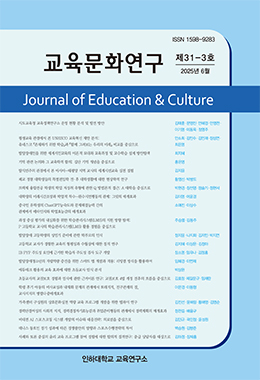본 연구는 평생교육 관점에서 UNESCO(유네스코)가 1972년에 발표한 보고서(‘포르 보고서’)와 2021년에 발표한 보고서(‘교육의 미래 보고서’)의 맥락을 비교·검토하여, 교육혁신 제안의 변화흐름과 차이점을 분석하고 어떻게 평생교육 담론과 접속하는지 그 양상에 관해 논의하는 것을 목적으로 한다. 유네스코는 사회의 변화에 따른 교육의 변혁적 역할에 대한 지향을 담은 주요 보고서를 발표해 왔으며 교육 패러다임 전환에 있어 중요한 통찰을 제공해 왔다. 본 연구에서는 평생교육 및 학습사회 중심의 교육 패러다임을 제시한 ‘포르 보고서’의 유산을 ‘교육의 미래 보고서’가 창조적, 비판적으로 계승하고 있음을 학습자관 변화, 교사 전문성 변화, 학교와 지역의 관계 변화, 고등교육의 성격 변화로 구성된 네 가지 쟁점에 대한 비교·분석을 통해 제시하였다. 연구결과, 지구에서 함께 살아가기 위한 지식을 구성할 권리와 책무를 가진 생태적 존재로 학습자관(觀)이 변화되고 있었으며, 공동 지식 생산자로서 교사의 변혁적 역할이 확장되고 있었다. 학교 역시 국가 주도의 제도화된 공(公)교육에서 지역사회와의 협력을 통해 공동재(common good)로서의 교육의 장을 열어가는 공(共)교육으로 변화하고 있으며, 다양한 기관과 연계하여 양질의 지식을 함께 생산해가는 지식 생태계의 핵심축으로서 고등교육기관의 역할이 확장되고 있음을 논의하였다. 이러한 변화 흐름은 평생교육의 관점에서 표준화 교육질서가 학습사회 질서로 새로운 형식성을 보이며(trans-forming) 재구조화되는 양상을 보여주며 나아가 미래교육을 위한 새로운 앎의 방식과 중층적 교육생태계를 고려해야 한다는 점을 시사한다.
This study, approached through the lens of lifelong education, aims to examine how UNESCO’s 1972 Faure Report (Learning to Be) and its 2021 Future of Education Report (Reimagining Our Futures Together) articulate evolving proposals for educational innovation in relation to lifelong education discourse. UNESCO’s reports highlight the transformative power of education in shaping societal change, offering insights into shifting paradigms―a trajectory this study builds on to explore how the 2021 Report rearticulates the legacy of lifelong education and the learning society envisaged in the Faure Report. A comparative analysis of four major issues―perspectives on the learner, teacher professionalism, school-community relations, and higher education―reveals how this paradigm has evolved across time and context. Findings indicate that learners are increasingly viewed as ecological beings with a shared responsibility to construct knowledge, while teachers’ roles are being redefined as co-constructors of knowledge. Schools are evolving from state-led systems into collaborative educational settings that advance education as a common good. Additionally, higher education institutions are playing an expanding role as key drivers of collaborative knowledge production within a dynamic knowledge ecosystem, generating institutional synergy across knowledge forms. Situated between continuities and changes, these developments suggest an ongoing process of trans-forming educational order into a learning society. They invite us to embrace new modes of knowing and foster multilayered educational ecologies for the future of education.




